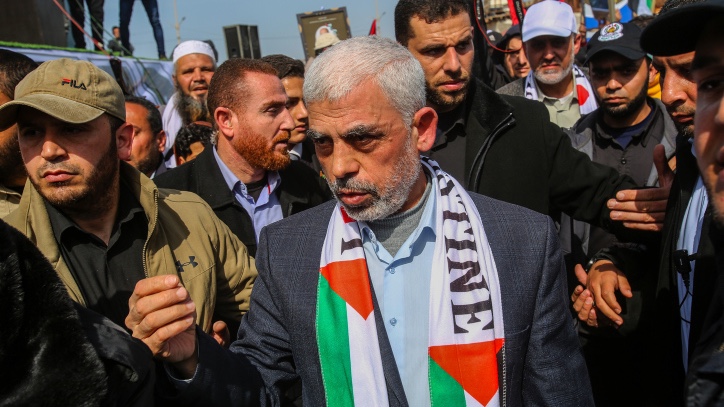Yahya Sinwar, the leader of Hamas in Gaza, will have to fear for his life for the first time now that the Israeli army has surrounded his hometown of Khan Younis.
Sinwar, who was known for his brutality even before the massacre on October 7, planned and oversaw the horrific crimes against civilians and soldiers in southern Israel that day.
However, despite his professional and careful planning of the bloody invasion of southern Israel, the Hamas leader made a major mistake.
Sinwar thought he knew the Israeli mentality and the weaknesses in Jewish society inside and out, but he repeatedly missed the mark, as we will see.
Hamas’s chief terrorist took over the leadership in Gaza in 2017 from Ishmail Haniyeh, who has since been living in Qatar.
Sinwar spent 23 years in an Israeli prison where he learned fluent Hebrew and studied Israeli society. Still, as mentioned, this study did not lead to an actual understanding of Israelis.
First, the Hamas leader misjudged Israel’s response to the barbaric acts of his army of nearly 3,000 men on that Black Shabbat.
Until October 7, Sinwar assumed Israel would launch a limited military campaign against his jihadist organization–a week, two, or maybe even three, and then it would be over.
After all, this had been the pattern in all military actions carried out by the IDF since Hamas, in an equally bloody manner, seized Gaza from the Palestinian Authority in the autumn of 2007.
Just as Hezbollah leader Hassan Nasrallah made a mistake in 2006 when his henchmen killed nine IDF soldiers in an attack with an anti-tank missile inside Israeli territory, and a devastating war ensued, Sinwar was now also mistaken about the Israeli response.
Ceasefire
The Hamas call for a ceasefire after more than six weeks of intense bombing and fighting by the Israeli army was significant in this regard.
Hamas needed the truce more than the IDF, that was clear from the start of the negotiation process.
According to insiders, Sinwar was shocked by the massive Israeli response, and until then had not imagined for a moment that the events of October 7 could herald the end of his rule in Gaza. The Hamas leader was reportedly also shocked by the Israeli raid on Shifa Hospital in Gaza City, and thought that, given the Jewish regard for human life, a hospital was the ideal place for a headquarters.
Hostages
The second mistake Sinwar made was the way he handled the hostages and the way he approached the release of around 100 of them.
The current Hamas leader was released from an Israeli prison in 2011 in the infamous Gilat Shalit deal, in which Israel freed 1,027 Palestinian terrorists in exchange for the captured IDF soldier.
From this deal Sinwar concluded that Israel was easy to blackmail, so he made kidnapping Israelis the second most important goal of his invasion plan.
He previously organized a mass hunger strike among Palestinians in prison to gain better conditions for two terrorists in Israeli custody, and from this experience Sinwar learned that these kinds of blackmail tactics could bring Israel to its knees.
Hamas’s number one terrorist again thought that by delaying the release process he could break Israeli resilience, but the psychological war that Sinwar waged around the week-long hostage release drama had the opposite effect.
Instead of breaking the spirit of the Israeli people, Sinwar, perhaps unknowingly, strengthened Israelis’ determination to destroy his regime and eliminate the Hamas leader at any cost.
The daily psychological games that Sinwar played in relation to the hostage releases, and the circus he organized during the actual transfer of the hostages to the Red Cross, hardened the Israelis and further strengthened the morale of IDF soldiers.
Misjudging the Jewish people
Sinwar probably did not know that in Jewish tradition the people of Israel are compared to an egg. When you boil an egg, unlike all other food products, it becomes harder the longer you cook it.
For the first time, there were even mothers of fallen IDF soldiers who demanded that the government continue the war until the end, and even left-leaning Israelis are now calling for the same.
Many in Israel changed their political views after October 7 and now no longer believe in negotiations for ‘peace.’
This was perhaps best expressed by Israeli journalist Shlomi Eldar, who was always in favor of compromising for peace, and who had many contacts with Arabs in Gaza.
During an interview, Eldar was asked whether he thought there was any point in talking about peace with the Palestinian Arabs in Gaza. He responded with a counter question: “Would we have negotiated with the Nazis?”
To the death
Sinwar is not the man to give up on Gaza, and certainly not on Hamas. When once asked why he had not yet married at the age of 29, Sinwar replied: “Hamas is my wife and my child.”
Michael Koubi, his Shin Bet interrogator, said at the time that Sinwar, besides being committed to Hamas, was committed to only one other cause, and that is the destruction of Israel and the killing of Jews. Koubi called Sinwar “a psychopath and a man willing to pay any price for his principles.”
However, the blind hatred for Israel seems to have blinded Sinwar so much so that he did not realize that an army of 40,000 men armed with rockets and other light weapons operating from an area surrounded on all sides cannot win against an professional military of more than 300,000 men armed with the most modern weapons, especially when the latter realizes that this is a war for the survival of the Jewish state.
This was Sinwar’s most fatal fallacy. He was used to the two-to-three percent firepower that the Israeli army used in all previous confrontations with Hamas and Palestinian Islamic Jihad in Gaza.
So convinced was the Hamas leader of victory over Israel that on October 7 he had a list drawn up of the more than 5,000 Palestinian terrorists in Israeli prisons whom he wanted released in a hostage deal.
Many in Israel assume that this was Sinwar’s final fallacy as leader of the jihadist terrorist organization Hamas, and await the day when the IDF or Mossad makes good on the government’s promise that Yahyah Sinwar is a “dead man walking.”














I am glad to see Israel leave the leftist ideology behind and determine to fight this war to win it. It is the only way to fight your enemies and make them believers that fighting Israel will only lead you to your death.